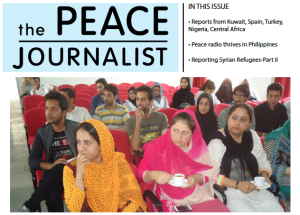As a former media junkie, I often feel split between complaining about corporate media and cheerleading them on when they put their all into serving as watchdogs.
Here’s my latest schism between exasperation and celebration:
- Exasperation: Why does the International New York Times co-organize the Oil & Money conference? What does this media corporation get out of that, and how can we trust its coverage of climate issues and wrongs committed by the fossil fuels industry?
- Celebration: The Los Angeles Times, in partnership with Columbia University’s Energy and Environmental Reporting Project and InsideClimate News, exposed decisions at ExxonMobil to sow public doubt about the oil industry’s impact on this planet’s climate. As a result, the corporation is under investigation in NY.
Even if they work for corporate media, many journalists are practical idealists—they want to contribute to righting wrongs and creating peace.
But the conventions under which they currently produce stories can’t always support that aim. For example, it’s common practice to heavily rely on government and corporate insiders for info and viewpoints. We’re seeing this play out right now, in the coverage of talks regarding Syria, in which the leaders of nation states have all the say while the views of those actually affected by war are left out.
I once halfheartedly pursued a career in investigative journalism—halfheartedly, because I couldn’t reconcile my desire to serve as a watchdog with the conventions of journalism, namely “objectivity” and profit-dependency on advertising and shareholders. I also thought I was too sensitive to do the job well, but I’ve come to see sensitivity as a journalist’s best strength: often, it’s sensitivity to suffering and corruption that fuels a journalist’s passion.
Peace Journalism (PJ) can help journalists do great New Story work by bridging public service with the best that big media has to offer.
 It’s not for nothing that whistleblowers and activist campaigns turn to the major press—such media have the budgetary and legal resources to keep investigations going and to handle government and corporate threats. Yet media “objectivity” can legitimize government and corporate wrongdoing, along with criminalizing truth-telling. Rather than giving equal weight to “both sides,” PJ prioritizes solution-seeking. As explained in The Peace Journalist, Park University’s semi-annual magazine: “Peace Journalism gives peacemakers a voice while making peace initiatives and nonviolent solutions more visible and viable.”
It’s not for nothing that whistleblowers and activist campaigns turn to the major press—such media have the budgetary and legal resources to keep investigations going and to handle government and corporate threats. Yet media “objectivity” can legitimize government and corporate wrongdoing, along with criminalizing truth-telling. Rather than giving equal weight to “both sides,” PJ prioritizes solution-seeking. As explained in The Peace Journalist, Park University’s semi-annual magazine: “Peace Journalism gives peacemakers a voice while making peace initiatives and nonviolent solutions more visible and viable.”
Moreover, PJ doesn’t obfuscate the emotional landscape of journalists—it doesn’t purport objectivity as the gold standard of journalism. Rather, PJ strives for transparency and is motivated by solutions, not continual controversy. It’s an integrative approach. As noted by Steven Youngblood, the director of Park University’s Center for Global Peace Journalism and editor of The Peace Journalist, “Peace journalism asks journalists to consider the consequences of their reporting.”
If you’re interested in media studies and the role journalism can play in easing conflict, you’ll want to check out the latest issue of The Peace Journalist, which reflects a broad range of concerned voices, from activists and journalists to academics. If you’re someone who writes about media issues, this magazine has an open submissions process and an engaged readership of students, teachers, and journalists.








